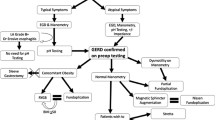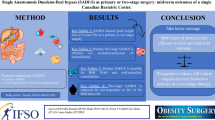Abstract
Introduction
Laparoscopic surgery is a viable treatment option for intrathoracic stomach (ITS); however, doubts have been raised regarding its efficacy. Routine use of mesh has been advocated. The aim of this study is to look at long-term objective and symptomatic outcomes after repair of ITS with selective use of mesh and fundoplication.
Materials and methods
A retrospective review of prospectively collected data was performed for patients who underwent surgical treatment of ITS from January 2004 to April 2009. ITS was defined as herniation of greater than 75% of the stomach into the chest on barium swallow. A standardized foregut symptom questionnaire was administered along with contrast study at 1, 3, and 5 years post surgery.
Results
Seventy-three patients with intrathoracic stomach were included in the study. Mean age was 70.6 ± 10.4 (44–88) years, and two-thirds were females. There were 7 transthoracic and 66 transabdominal repairs (64 laparoscopic, 1 open, and 1 laparoscopic to open conversion). There was one intraoperative death, due to bleeding. Antireflux surgery was performed in 43 patients (20 Nissen, 18 Toupet, 1 Dor, and 4 Roux-en-Y gastric bypass (RNYGB)). Ten patients had Collis gastroplasty for short esophagus. Mesh was used in ten (13.7%) patients for crus reinforcement. Objective follow-up was available for 88%, 78%, and 92% patients at 1, 3, and 5 years, respectively. There were 5% (3/61), 11% (4/36), and 17% (2/12) radiological failures at these intervals. There was no significant difference in mean symptom and satisfaction scores or use of proton pump inhibitor (PPI) between patients with and without antireflux surgery. Mean satisfaction scores were 9.1, 9.0, and 9.0 at 1, 3, and 5 years, respectively.
Conclusion
Laparoscopic repair of ITS with selective use of mesh and fundoplication is feasible, safe, and durable, resulting in a high degree of patient satisfaction.





Similar content being viewed by others
References
Leeder PC, Smith G, Dehn TC (2003) Laparoscopic management of large para-esophageal hiatal hernia. Surg Endosc 17:1372–1375
Andujar JJ, Papasavas PK, Birdas T, Robke J, Raftopoulos Y, Gagne DJ et al (2004) Laparoscopic repair of large para-esophageal hernia is associated with a low incidence of recurrence and reoperation. Surg Endosc 18:444–447
Luketich JD, Raja S, Fernando HC, Campbell W, Christie NA, Buenaventura PO et al (2000) Laparoscopic repair of giant para-esophageal hernia: 100 consecutive cases. Ann Surg 232:608–618
Yano F, Stadlhuber RJ, Tsuboi K, Gerhardt J, Filipi CJ, Mittal SK (2009) Outcomes of surgical treatment of intra-thoracic stomach. Dis Esophagus 22:284–288
Skinner DB, Betsey RH (1967) Surgical management of esophageal reflux and hiatal hernia: long term results with 1030 patients. J Thorac Cardiovasc Surg 53:33–54
Cuschieri A, Shimi S, Nathanson LK (1992) Laparoscopic reduction, crural repair, and fundoplication of large hiatal hernia. Am J Surg 163:425–430
Diaz S, Brunt LM, Klingensmith ME, Frisella PM, Soper NJ (2003) Laparoscopic para-esophageal hernia repair, a challenging operation: medium-term outcome of 116 patients. J Gastrointest Surg 7:59–66
Gantert WA, Patti MG, Arcerito M, Feo C, Stewart L, DePinto M, Bhoyrul S, Rangel S, Tyrrell D, Fujino Y, Mulvihill SJ, Way LW (1998) Laparoscopic repair of para-esophageal hiatal hernias. J Am Coll Surg 186:428–432
Horgan S, Eubanks TR, Jacobsen G, Omelanczuk P, Pellegrini CA (1999) Repair of para-esophageal hernias. Am J Surg 177:354–358
Huntington TR (1997) Short-term outcome of laparoscopic para-esophageal hernia repair. A case series of 58 consecutive patients. Surg Endosc 11:894–898
Swanstrom LL, Jobe BA, Kinzie LR, Horvath KD (1999) Esophageal motility and outcomes following laparoscopic para-esophageal hernia repair and fundoplication. Am J Surg 177:359–363
Wu JS, Dunnegan DL, Soper NJ (1999) Clinical and radiologic assessment of laparoscopic para-esophageal hernia repair. Surg Endosc 13:497–502
Hashemi M, Peters JH, DeMeester TR, Huprich JE, Quek M, Hagen JA et al (2000) Laparoscopic repair of large type III hiatal hernia: objective follow up reveals high recurrence rate. J Am Coll Surg 190:553–560 discussion 560–551
Maziak DE, Todd TR, Pearson FG (1998) Massive hiatus hernia: evaluation and surgical management. J Thorac Cardiovasc Surg 115:53–60 Discussion 61–52
Oelschlager BK, Pellegrini CA, Hunter J, Soper N, Brunt M, Sheppard B et al (2006) Biologic prosthesis reduces recurrence after laparoscopic para-esophageal hernia repair: a multicenter, prospective, randomized trial. Ann Surg 244:481–490
Granderath FA, Schweiger UM, Kamolz T, Asche KU, Pointner R (2005) Laparoscopic Nissen fundoplication with prosthetic hiatal closure reduces postoperative intra-thoracic wrap herniation: preliminary results of a prospective randomized functional and clinical study. Arch Surg 140:40–48
Frantzides CT, Madan AK, Carlson MA, Stavropoulos GP (2002) A prospective, randomized trial of laparoscopic polytetrafluoroethylene (PTFE) patch repair vs simple cruroplasty for large hiatal hernia. Arch Surg 137:649–652
Stadlhuber RJ, Sherif AE, Mittal SK, Fitzgibbons RJ Jr, Michael Brunt L, Hunter JG et al (2009) Mesh complications after prosthetic reinforcement of hiatal closure: a 28-case series. Surg Endosc 23:1219–1226
Nason KS, Luketich JD, Qureshi I, Keeley S, Trainor S, Omar Awais et al (2008) Laparoscopic repair of giant para-esophageal hernia results in long-term patient satisfaction and a durable repair. J Gastrointest Surg 12:2066–2077
Mittal SK, Awad ZT, Tasset M, Filipi CJ, Dickason TJ, Shinno Y et al (2000) The preoperative predictability of the short esophagus in patients with stricture or para-esophageal hernia. Surg Endosc 14:464–468
Awad ZT, Filipi CJ, Mittal SK, Roth TA, Marsh RE, Shiino Y et al (2000) Left side thoracoscopically assisted gastroplasty: a new technique for managing the shortened esophagus. Surg Endosc 14:508–512
Draaisma WA, Gooszen HG, Tournoij E, Broeders IAMJ (2005) Controversies in para-esophageal hernia repair: A review of literature. Surg Endosc 19:1300–1308
Athanasakis H, Tzortzinis A, Tsiaoussis J, Vassilakis JS, Xynos E (2001) Laparoscopic repair of para-esophageal hernia. Endoscopy 33:590–594
Lorstat-Jacob JL (1957) L’endo-brachyesophage. Ann Chir 11:1247
Herbella FA, Patti MG, Del Grande JC (2009) When did the esophagus start shrinking? The history of the short esophagus. Dis Esophagus 22(7):550–558
Mercer CD, Hill LD (1986) Surgical management of peptic esophageal stricture: twenty year experience. J Thorac Cardiovasc Surg 91:371–378
Coster DD, Bower W, Wilson VT, Brebrick RT, Richardson GL (1997) Laparoscopic partial fundoplication vs. laparoscopic Nissen–Rossetti fundoplication: short term results of 231 cases. Surg Endosc 11:625–631
Lal DR, Pellegrini CA, Oelschlager BK (2005) Laparoscopic repair of para-esophageal hernia. Surg Clin North Am 85:105–118
Pearson FG, Todd TR (1987) Gastroplasty and fundoplication for complex reflux problems: long term results. Ann Surg 206:473–481
Swanstrom LL, Marcus DR, Galloway GQ (1996) Laparoscopic Collis gastroplasty is the treatment of choice for the shortened esophagus. Am J Surg 171:477–481
Johnson AB, Oddsdottir M, Hunter JG (1998) Laparoscopic Collis gastroplasty and Nissen fundoplication: a new technique for the management of esophageal foreshortening. Surg Endosc 12:1055–1060
Terry ML, Vernon A, Hunter JG (2004) Stapled-wedge Collis gastroplasty for the shortened esophagus. Am J Surg 188(2):196–198
Casabella F, Sinanan M, Horgan S, Pellegrini CA (1996) Systematic use of gastric fundoplication in laparoscopic repair of para-esophageal hernias. Am J Surg 171:485–489
Disclosures
Authors Sumeet Mittal, Jai Bikchandani, Fumiaki Yano, Tommy Lee, and O Gurney have no conflicts of interest or financial ties to disclose.
Author information
Authors and Affiliations
Corresponding author
Appendix 1
Appendix 1
Postprocedure questionnaire


Rights and permissions
About this article
Cite this article
Mittal, S.K., Bikhchandani, J., Gurney, O. et al. Outcomes after repair of the intrathoracic stomach: objective follow-up of up to 5 years. Surg Endosc 25, 556–566 (2011). https://doi.org/10.1007/s00464-010-1219-3
Received:
Accepted:
Published:
Issue Date:
DOI: https://doi.org/10.1007/s00464-010-1219-3




